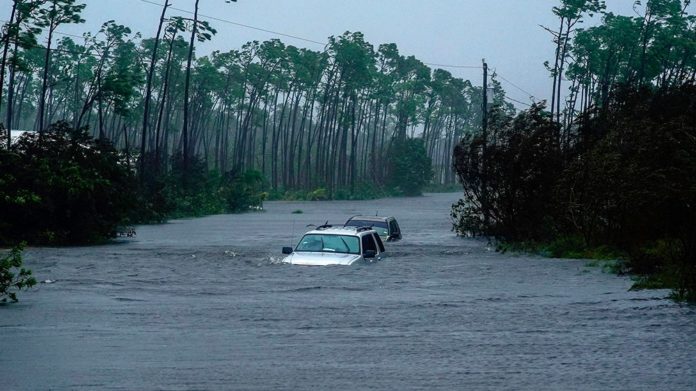Thousands left without shelter and likely to face food and water shortages as Bahamas hurricane tracks towards Florida
US officials and counterparts around the world sent out an urgent call for help for the Bahamas after the northernmost islands in the archipelago were pulverized by Hurricane Dorian.
Thousands of residents of Grand Bahama and Abaco islands are without shelter, stranded by flooding and are likely to suffer shortages of food, water and medicine that will worsen without quick action by the international community, according to coordinated messages from the United Nations, the US state department, the US embassy in Nassau and local officials.
“We are in the midst of a historic tragedy,” said the Bahamian prime minister, Hubert Minnis. “The devastation is unprecedented and extensive.”
The dimensions of the humanitarian disaster began to emerge after the slow-moving storm, which took about 36 hours to cross the five-mile-wide Grand Bahama, finally left the country on Tuesday afternoon.
Minnis announced late in the evening that the death toll had risen to seven, with more deaths expected, and predicted that rebuilding would require “a massive, coordinated effort”.
“We are in the midst of one of the greatest national crises in our country’s history,” Minnis told a news conference. “No effort or resources will be held back.”
The storm hit Abaco island on Sunday as a category 5 hurricane with wind gusts of up to 220mph – making it the strongest Atlantic storm ever to make landfall, tied with the Labor Day hurricane of 1935.
In a country accustomed to harrowing encounters with fierce storms, Dorian registered as a disaster on another scale.
“Dorian will not really move away,” said a tweet from the newspaper in Freeport, the main city on Grand Bahama, on Tuesday morning. “Heavy rain. This hurricane will totally destroy this island.”
The terrible consequences were visible from the first helicopter overflights of Abaco and Grand Bahama islands on Tuesday. Video footage showed lakes of seawater instead of streets, blasted debris where homes once stood, boats thrown inland like discarded bath toys, denuded trees and the occasional lone structure still standing. In many areas, life on the islands appeared to have simply been erased.
“It’s total devastation. It’s decimated. Apocalyptic. It looks like a bomb went off,” Lia Head-Rigby, who helps run a local hurricane relief organization, told the Associated Press. “It’s not rebuilding something that was there; we have to start again.”
Emergency access was threatened by flooding at the Freeport international airport, where runways lay under 6ft of water. The main Freeport hospital was likewise flooded, and an estimated 13,000 homes destroyed.
Flooding drove residents on to roofs, water lapping over second-story windowsills and water driving against shuddering glass. There was waist-deep water in the streets and higher, which residents were struggling to swim or wade through to safety.
Freeport is about 70 miles east of West Palm Beach, Florida, and is a popular cruise ship and tourist destination boasting upwards of 1 million visitors a year.
“The #Bahamas needs our help,” Francis Suarez, the mayor of Miami, Florida, tweeted on Tuesday.
“Our prayers are with our Bahamian friends as they confront the aftermath of Hurricane #Dorian,” tweeted the US secretary of state, Mike Pompeo. The USAID relief agency put out a call for “urgently-needed humanitarian assistance”.
The US coast guard has airlifted at least 21 people injured on Abaco Island. Marvin Dames, the Bahamas’ minister of national security, said that more casualties were expected.
“This was a crisis of epic proportions,” he told reporters. “The reality of it all is, unfortunately, we will see more deaths. I can’t see any way out of it.”
One radio station said it had received more than 2,000 distress messages, the Associated Press reported, including reports of a five-month-old baby stranded on a roof and a woman with six grandchildren who cut a hole in a roof to escape rising floodwaters. At least two designated storm shelters flooded.
Queen Elizabeth sent a message of support for the country, which gained independence in 1973.
“At this very difficult time, my thoughts and prayers are with those who have seen their homes and property destroyed, and I also send my gratitude to the emergency services and volunteers who are supporting the rescue and recovery effort,” the message said.
Abaco and Grand Bahama have a combined population of about 70,000 and have peak elevations of no more than 40ft above sea level.
Red Cross spokesman Matthew Cochrane said more than 13,000 houses, or about 45% of the homes on Grand Bahama and Abaco, were believed to have been severely damaged or destroyed. UN officials said more than 60,000 people on the hard-hit islands will need food, and the Red Cross said some 62,000 will need clean drinking water.
“What we are hearing lends credence to the fact that this has been a catastrophic storm and a catastrophic impact,” Cochrane said.
Lawson Bates, a staffer for Arkansas-based MedicCorps, flew over Abaco and said: “It looks completely flattened. There’s boats way inland that are flipped over. It’s total devastation.”
The storm caused flooding on other Bahamian islands as well, including in the capital of Nassau.
The US coast guard, USAID relief agency and UN relief agencies joined efforts led by the Royal Bahamas Defense Force and the National Emergency Management Agency (Nema) of the Bahamas.
The US embassy in Nassau advised those in need of urgent assistance to call Nema at 322-6731 and send their locations to +1 (242) 557-5202 via WhatsApp. Officials advised those outside the Bahamas wishing to provide assistance to visit the Center for International Disaster Information.
Speaking on a cellphone video shot from the heart of the disaster, the Bahamian member of parliament Iram Lewis sent a plea for assistance.
“We are going to need a lot, a lot of support after this hurricane is over.”

































